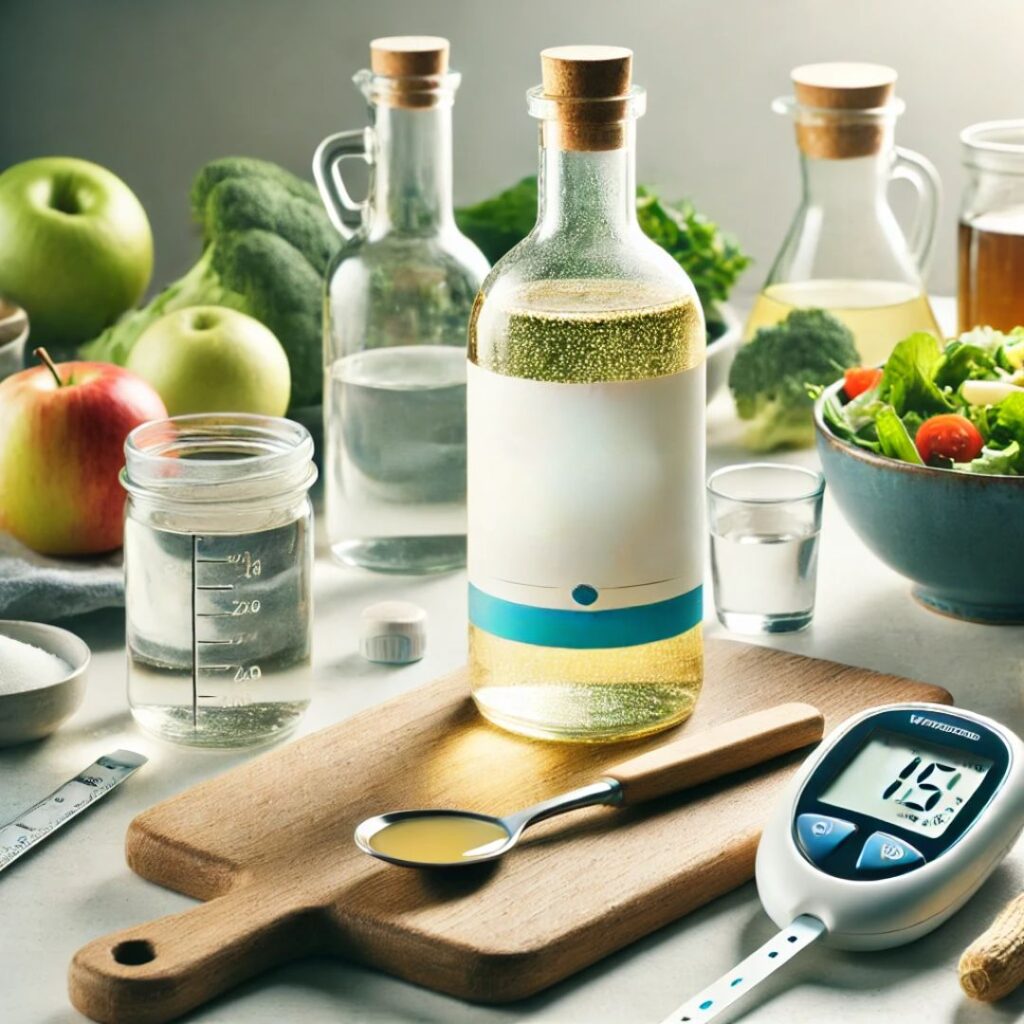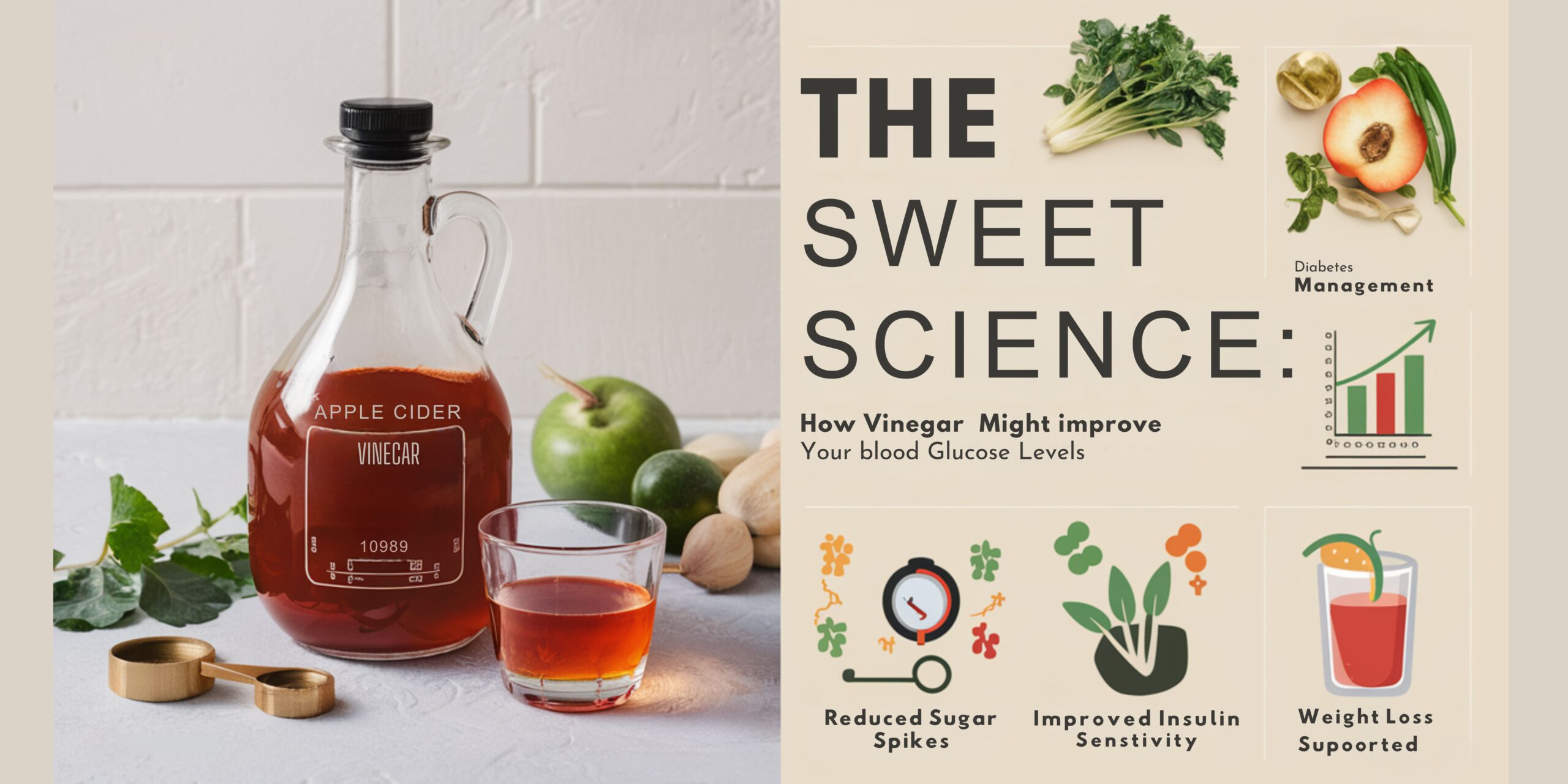The Sweet Science : How Vinegar Might Improve your blood glucose levels
Vinegar is a liquid used for preservative purposes and to add taste or flavor to the food. It is also helpful in the world of health and wellness. Nowadays vinegar has got our attention regarding the potential benefits to the blood glucose levels. This ingredient might hold the power of managing your diabetes and improving your overall health.


What is Blood Sugar?
Before explaining the benefits of the vinegar, it is important to understand the concept of blood sugar. Blood sugar or we can say Glucose, is a simple sugar that provides energy to cells throughout the body. When we consume carbohydrates, they will break down into glucose, which will enter our bloodstream. Then your pancreas will release insulin, a hormone that helps to control the blood sugar level by absorbing glucose for energy.
If our body doesn’t produce enough insulin or insulin doesn’t use its power effectively, our blood sugar levels can increase. this condition is called hyperglycemia, which can lead to serious health problems like heart disease, stroke, kidney disease, never damage, and diabetes.
Benefits of Vinegar
There are various studies which have explored the relationship between vinegar and blood glucose levels. More research is required on vinegar to fully understand the workings of the vinegar. Following are the key findings of the various researchers to date :
- Reduced Post-Meal Sugar Spikes:
- Several studies have shown that, if you are consuming vinegar before or with meals, it will help you to reduce the post-meal blood sugar spikes. this is beneficial for people who are suffering from diabetes or are on the verge of developing diabetes.
- The exact mechanism behind this effect is not fully understood yet, but it may involve the release of glucose in your bloodstream. so that you will not get the sugar spike instantly rather it will release glucose slowly in your blood which will not put the pressure on pancreas to release large quantities of insulin to absorb this extra glucose released in your bloodstream.
2. Improved Insulin Sensitivity
- Various studies have shown that vinegar improves insulin sensitivity, meaning our cells will able to respond better to insulin and absorb glucose efficiently. This mainly helps to regulate blood sugar levels and prevent hyperglycemia.
- Acetic content in the vinegar is the reason for increased insulin sensitivity, which activates certain signaling pathways, which enhance glucose absorption by cells.
3. Weight Loss Support:
- Vinegar is also very helpful in the case of weight management. More research is required on this topic, but some studies have proven that vinegar consumption leads to a reduction in body weight and body mass index (BMI)
- It might work due to the ability to increase feelings of fullness and reduce appetite, which ultimately results in a calorie deficit.


Types of Vinegar and Dosage
- There are various types of vinegar available in the market, apple cider vinegar is the most commonly studied one for blood glucose control. Other kinds of vinegar like rice vinegar or balsamic vinegar, may also have beneficial effects.
- The optimal dosage of vinegar for blood sugar management can be different depending on individual factors like age, Weight, and overall health. Generally, it is recommended to start with a small amount, such as 1-2 tablespoons diluted in water, and after some time you’ll get to know your optimal dosage.
Note: Always drink vinegar by diluting it in water. Otherwise, it will have a bad effect on your teeth due to its acidic nature.
Including Vinegar in Your Diet
Following are the ways to include vinegar into your diet:
- Salad Dressing: Vinegar can be used as a base for salad dressing, combining it with olive oil, herbs, and spices.
- Marinades: It is also used for marinades of meat, poultry, or fish using vinegar, garlic, and other seasoning.
- Beverages: You can add a little vinegar in water or tea for a tangy and refreshing drink.
- Pickling: Vinegar is also used for making pickle or fruit pickle. it helps to preserve them for longer periods.
Important considerations:
- Consult with a doctor or healthcare professional: Before incorporating vinegar into your diet, you must consult your doctor, especially if you have any medical condition.
- Potential Side Effects: Generally Vinegar is safe when consumed in moderation. Some people may experience side effects like digestive discomfort or tooth erosion.
- Drug interactions: If you are taking any medicine for diabetes or any other condition, it is important to know what is the interaction of those medications with vinegar.
Conclusion
Incorporating vinegar into your diet may offer some promising benefits for blood glucose management, particularly for those dealing with diabetes or prediabetes. With its potential to reduce post-meal sugar spikes, enhance insulin sensitivity, and support weight management, vinegar, especially apple cider vinegar, presents a simple and accessible addition to your health regimen.
However, while the research is encouraging, it’s essential to approach vinegar as a complementary tool rather than a standalone solution. Integrating vinegar into a balanced diet and healthy lifestyle, while consulting with a healthcare provider, will yield the best results for managing blood glucose levels. As always, moderation is key, and understanding how vinegar interacts with your body and any medications is crucial. By considering these factors, you can make the most of vinegar’s benefits while maintaining overall health and well-being.










